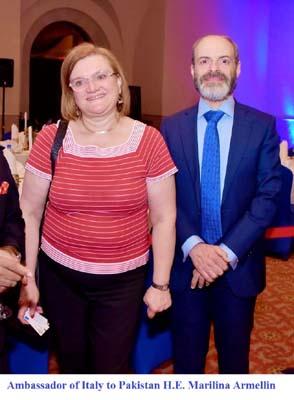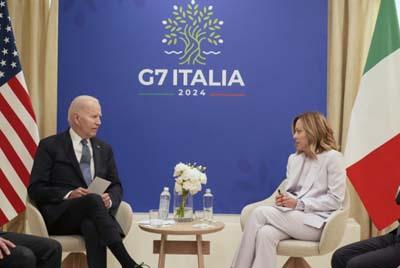
Italy: Meloni shows credentials at G7 summit
Crispian Balmer

Bari: Since taking office in 2022, Italian Prime Minister Giorgia Meloni has proved a pragmatic partner on major international issues, assuaging fears she would be a dogmatic conservative unwilling to compromise.
But at the Group of Seven summit that she hosted in southern Italy this week, Meloni showed she had some red lines dear to her nationalist camp that she was ready to fight for, especially issues relating to the family and reproduction rights.
In the build-up to the June 13-15 summit, attention had been firmly focused on securing a deal on a multibillion-dollar loan for Ukraine, using frozen Russian assets, and creating ways to level the playing field in trade with China.
Broad consensus was found on both issues and hailed as proof of Western unity in the face of global challenges.

Then, out of the blue, diplomats revealed that Italy had demanded the removal of specific reference to “safe and legal abortion” from the final G7 statement and also wanted to water down language on vaccination funding.
Despite being isolated, Meloni largely got her way on both issues, using Italy’s position as rotating president of the wealthy nation club to lead the negotiations where it wanted, diplomats who followed the discussions said.
“Meloni is against abortion and always has been, so that was her red line and honestly we pushed early on. But when the presidency said ‘no’ that was that,” said a European diplomat, speaking on condition of anonymity.
Like many arch-conservative groups in Europe and the United States, Meloni’s Brothers of Italy party is opposed to abortions and calls for the promotion of traditional family values.
“She has thrown a bit of red meat to her supporters,” said Daniele Albertazzi, politics professor at Britain’s Surrey University and an expert in political populism.
“She wants to stress that she is not on the same page as some progressive leaders on these sort of issues because this is part of her identity and it has been diluted since she became prime minister,” he added.
French President Emmanuel Macron, a centrist who has clashed with Meloni in the past over social concerns, including migration, told reporters at the summit that he regretted the fact there was no longer specific reference to “abortion”.
Meloni shrugged off the dispute, arguing on Saturday that this week’s statement made it clear that the G7 continued to support the aims of its Hiroshima declaration, which backed access to abortion, meaning it was redundant to repeat the previous text.
“I sincerely believe that the controversy was totally contrived,” she told reporters, adding that she had no intention of outlawing abortion in Italy.
However, signalling that there had been genuine discomfort over Italy’s position, a senior U.S. official said President Joe Biden had objected to an initial draft that removed reference to abortion and made no mention of Hiroshima.
A senior White House official later said Biden fully supported the final wording of the 2024 communique. “He felt strongly about the language that made it through,” he said.
Pope Francis, an outspoken opponent of abortion, was a guest at the G7 summit and Italy’s Agriculture Minister Francesco Lollobrigida, who is Meloni’s brother-in-law, said this week it would not have been appropriate to talk about pregnancy terminations in the statement given his presence at the meeting.
A European diplomat, who declined to be named, said that during discussions on whether or not to use the word, an Italian counterpart had told fellow negotiators: “the pope will never accept it”. They then corrected themselves to say: “Oh, I mean, my prime minister will never accept it”, the diplomat said.
Italian officials did not immediately comment on this.
While Meloni’s objection to abortion has long been known, the move to water down the language on vaccinations came as more of a surprise.
Italy removed a line included in the 2023 communique which called for “investment in global health through vaccine manufacturing capacity worldwide”. This year, there was just a reference to “regional vaccines manufacturing initiatives”.
Vaccine scepticism has embedded itself in conservative camps both in the United States and Europe.
While Meloni herself did not endorse no-vax campaigners during the COVID pandemic, her party opposed many of the tough COVID regulations imposed at the time, which required Italians to be vaccinated in order to go to work, use public transport, or enter shops and restaurants.
“She’s not anti-vax, but she’s partially anti-vax,” said one of the European diplomats who followed the negotiations. Meloni’s office declined to comment.
